- Home
- Iris Murdoch
An Unofficial rose
An Unofficial rose Read online
An Unofficial rose
Iris Murdoch
Iris Murdoch
An Unofficial Rose
Chapter One
I am the resurrection and the life, saith the Lord; he that believeth in me, though he were dead, yet shall he live.
FANNY PERONETT was dead. That much her husband Hugh Peronett was certain of as he stood in the rain beside the grave which was shortly to receive his wife's mortal remains. Further than that, Hugh's certainty did not reach. The promise meant little to him that the priest had uttered. He did not even know what Fanny had believed, let alone anything concerning the possible consequences of her beliefs. After more than forty years of marriage, and although his wife had not been a mysterious woman, he had not really known what was in her heart. He looked across the open grave. The tiny coffin opposite to him, under its pile of sodden roses, was like that of a child. She had shrunk so much in her last illness.
Fanny had had few friends. Yet the gathering at the graveside, under its receding rows of black umbrellas, was a large one, and the family itself accounted for little of the throng. In the chapel, during the dreary singing of ‘Abide with me’, Hugh had been too dazed to note who was present and who was not. Now he began a little to look cautiously about him. Fanny's peevish architect brother was there, of course, the one who had inherited the pictures. He looked so transparent now with thinness and age that it was hard to remember that he was her younger brother; Fanny herself had been so plump and busy, such a bouncy little person, till the cancer came. Then there were the others, his own people, Fanny's and his people. His son Randall and Randall's wife Ann stood nearest to him; and half opposite, little figures in navy blue raincoats, were two of his grandchildren, Randall’s daughter Miranda, and young Penn Graham, Sarah's eldest son and now Hugh's eldest grandchild. Dear Sarah was in Australia with her husband and Penn was there, as Sarah had put it in her long emotional cable, to represent the love of all the Grahams. What a rotten time the boy had had, Hugh reflected. It was almost indeed as if he had come for Fanny's death-bed. They had even forgotten his fifteenth birthday. Poor Fanny had been looking forward so much to seeing him on this long-promised visit; but by the time he arrived she had become too deeply concerned with her own last things.
With so much rain it was hard to tell who was weeping. For those who, like himself, felt it indelicate to raise an umbrella in the presence of death, external nature provided a semblance of that tribute which, from a?winter? spring, the heart could not or would not offer. Hugh had no tears. But Penn was certainly weeping. Hugh looked at the boy. He seemed slight and childish in his school mackintosh, his little thin face all red with grief, as he stared down at the raindrops fretting the pool of water in the pit below him, and thrust his knuckles regularly into his eyes. He had scarcely known his grandmother, but because she was his grandmother he had loved her, and he sorrowed now with a complete sorrow as at an utter loss. Hugh envied the completeness. All the same there was something frail, almost sentimental about the boy. He was quite unlike the tough Australian grandson of Hugh's imaginings. Given what the boy's father was like, they had all been prepared for something roughish, but not for this rather pathetic elf.
Hugh looked at Miranda. She too appeared younger than her age.
She must surely, he reminded himself, be fourteen now. Or was she? It was shocking not to know. Her very pale freckled face, so like her mother's, wore a paralysed self-conscious expression. She was not crying. She looked steadily upward above the heads of the mourners, determined not to catch the eye of her parents, and as if absorbed in some long calculation of her own. Now and then with a nervous hand she patted the unaccustomed little black hat which covered her red-golden hair, her bright hair which fell usually in big separate locks like a cap of autumn leaves, hidden now except where a few rain darkened ends clung to her neck. She was to Hugh a totally mysterious little girl.
The other person who was really crying was Ann. As she was on Hugh's deaf side he could not hear her sobs, but he could feel against the sleeve of his overcoat the convulsive movements of her shoulder. He gave her a quick sideways look. Her eyes and nose were red, but the rest of her face absurdly retained its usual waxen paleness so that she looked like a rather damp clown. A wet scarf covered her hair, which had been, when Randall married her, so flaming, but which had faded to a pale ginger now on its way to becoming a sandy grey. She had loved Fanny; and Fanny had loved her too, in her way. 'Such a serious girl', Fanny had said of her at first, a little timidly, a little suspiciously; and timidity and suspicion had always remained to temper their good relations, for Fanny was never very far from thinking that Ann thought her a fool. But Fanny had believed in Randall's marriage, had believed in it right up to the end, seeing no danger signs and noticing no deterioration; and perhaps that very belief had helped to keep Ann and Randall together.
We brought nothing into this world and it is certain we can carry nothing out.
It was true that Fanny had brought nothing into this world. On the other hand she had had plenty of things waiting for her when she arrived. It was many years now since Hugh had stopped wondering to what extent he had married for money. Plump rose-red Fanny had somehow so much made one with her rich art-dealer father and the great family collection that it made no sense even to ask whether he had married her for the pictures: and by the time the pictures went away to the boorish brother and the collection was dispersed Hugh hardly wanted them any more. Except the Tintoretto. That he had always wanted, and his wish had been rewarded, since Fanny got the gem, the Tintoretto. Perhaps indeed he had married her for the Tintoretto, as in a curious muddled way it had sometimes seemed to him in his dreams when his poor wife and the picture became strangely identified with each other.
For man walketh in a vain shadow, and disquieteth himself in vain: he heapeth up riches and cannot tell who shall gather them.
Hugh hoped that the children were not too disappointed about Fanny's will. She had left everything to him and nothing to them, which was characteristic of her and perfectly right. Yet Randall had shown resentment enough when Hugh, paid Penn Graham's fare to England, as if it were already Randall's own money that was being wasted. Hugh hoped there would be no unpleasant discussion. It was true that Sarah and Randall both needed money: Sarah to feed her increasing brood, and Randall — Randall for his freedom. The rose nursery, Randall's creation, still brought in an income. But Randall's heart was no longer in it: heaven knew indeed where it had fled to by now, that most volatile organ. Hugh reflected that perhaps it was better after all that his son should not be wealthy, should not, anyway, be wealthy yet. They could wait, both of them, they could wait for what was left of Fanny' s cash.
It would not be very long. Old age, which when he had been younger had seemed a coloured prospect of broken wisdom, a condition like that of a late Titian, full of great melancholy shattered forms, now presented itself, when he was on the brink of it as a state, at best, of distraction, irritation and diminished dignity: his rheumatism, his indigestion, his weak legs, his deafness, the perpetual buzzing in his head. On the brink of it was indeed how he now from day to day imagined himself. To picture himself, passing that limit would be to admit into his imagination the reality of death; and this even now he could not do. Fanny had not done it, up to the end; and as Hugh well knew, her spiritual adviser, the rector Douglas Swann, had not been able, in the course of many visits, to bring himself to steer the conversation round to the state of her soul. Fanny had not been equipped for the seriousness of mortality, and one had felt, in the midst of grief, almost embarrassed for her in this respect.
When thou with rebukes dost chasten man for sin, thou makest his beauty to consume away, like as it were a moth fretting a garm
ent.
His own beauty, such as it was, had certainly consumed away some time ago. Others of his contemporaries had done better, he reflected, as he looked across at his old friend and rival Humphrey Finch. Humphrey, for instance, had kept his hair. He stood now in a respectful attitude under his umbrella, his enviable head with its thick white mane soberly bowed, while his eyes rested thoughtfully upon Hugh's grandson. Humphrey was a quick man and Hugh was a slow man; and although Humphrey's career had come to an untimely end after an incident in Marrakesh which even the British Foreign Service, with its wide tolerance of eccentricity, could not overlook, Hugh still felt that Humphrey had been the more successful of the two. Hugh's own career in the Civil Service after he had decided, or rather discovered, that he was not a painter, had been if not exactly meteoric at least exemplary and such as could pass as distinguished. Flattering words in high quarters had attended his retirement. Yes, he could pass as a distinguished man; just as he could pass as a good husband, and few would ever know anything to the contrary. But the terror and the glory of life had passed him by.
Hugh shifted his gaze to the neighbouring umbrella under which he made out the unusually fashionable hat and unusually subdued face of Humphrey's wife, Mildred, who, although she had not been particularly fond of Fanny, had produced for the occasion a look of?heavy? reflective melancholy and even a few tears. She was leaning, not upon her husband's Ann, but upon that of her handsome younger brother, Colonel Felix Meecham, who held the umbrella high above her and contrived, even with both Anns thus occupied, somehow to stand at attention. 'Poor Mildred', as she was called by those of her acquaintance who knew, as indeed who did not know by now, the scandal of her husband's. sexual preferences. Yet Mildred was not a figure to pity.
Mildred, whom Hugh had kissed passionately once, he remembered, on a summer evening over twenty-five years ago, when they were both already sensible middle-aged married people. He wondered, as he watched her dab her eyes with a small handkerchief, whether she still recalled that curious incident.
The days of our age are three score years and ten.
Fanny had not lived out her appointed span. The cancer came sooner. And he himself had yet another three years to go. Well, Fanny had lived, she had married a distinguished man, she had borne children, she had loved her husband and her children and her grandchildren and her cats and dogs. She had been, he supposed, happy. She had not been altogether cheated. Hugh recalled the last funeral he had attended. When his eldest grandson Steve, Randall's boy, had died of polio Hugh had felt a frenzy of anger and misery which was quite unlike the resigned grief of today. Steve's death had been something gratuitous and wicked, and Hugh had raved at the universe in vain to find a place to pin that wickedness down.
Nothing had been right since Steve died. Randall had been reeling drunk at the funeral and said later that Ann had never forgiven him. It was rather perhaps that he had never forgiven Ann, upon whom by some insane and fantastic logic he had seemed to fix the blame of his bereavement. Drunk he had been at the funeral, and drunk he had been with increasing frequency ever since. Doubtless he had loved in Steve and lost in him his own immortality, his own more radiant self, for the boy had resembled him to a singular degree. Where had it come from, Hugh wondered, all that warmth? Not from Fanny certainly, and not from himself. He was a slow man and he had no warmth; it is a thing that one knows. What they all remembered now about Steve was his warmth and not that he had been, like his father, impossible. Yet those who, like Steve, like Randall, compel love, also for just that reason, Hugh reflected, merit the love they compel. While the worthy and deserving ones, such as Ann, are, by a terrible justice, unloved. Hugh had long ago ceased feeling guilty or even puzzled that he did not love Ann. He liked and respected and admired her, but there was no compulsion of warmth. Yet, when she was young and her hair was as red as Miranda's, Randall had loved her; and perhaps, it had been hinted in the village, Douglas Swann, though serenely married himself, loved her now in a way that was the tiniest bit more than pastoral.
By shifting his head slightly Hugh could see behind Ann the pious profile of Douglas Swann, and seemingly superimposed upon it, in his sidelong glimpse, as in a composite photograph, the handsome face of Clare Swann, her prominent eyes ablaze with curiosity and life. Since Fanny had been moved, two months ago, to the clinic in London, Douglas Swann had come up from Kent several times to see her, and today they had both come, which was very good of them, considering how busy they were, Hugh reflected with irritation. At least he was being spared the experience of having Swann conduct the burial service. Words of such terrible weight are best not profaned by those whom one has caught out being, if not positively frail, at least certainly absurd. With added annoyance Hugh recalled that he had promised to drive the Swanns back to Kent after the service was over. How much, how very much now, he did not want to go back to Grayhallock, to the big unspirited house and the acres of dreary roses. But there was such a lot still to be done there, so many tasks, so much sheer tidying up, now that poor Fanny was gone. Well, it would all be done, and then he would be free. He would be free. Ah, what did that mean?
Thou hast set our misdeeds before thee: and our secret sins in the light of thy countenance.
It was just as well he reflected that most of his own were, fortunately, secret. Yes, he had passed as a good husband. No one had known about Emma Sands. He had got past. Perhaps it was just this which should be, when his own time came, engraved upon his tombstone: he got away with it, he got past. His career had been successful, his marriage had been successful. No onehad known about Emma: that is no one had known much or anything for certain; and people notice so little and they forget. Fanny had known, of course; but Fanny had been so incredulous, so puzzled, so unable to cope in her thought with the irrational violence of that episode, that she had later made it, in a way, as if it had never happened. She had seemed to forget it utterly; and this too Hugh could hardly forgive her. Because he had spared her the details, she had never known how nearly she had lost him. Or had she, he wondered fruitlessly and for the thousandth time, so nearly lost him? He was, when all was said and done, a conventional man.
His mind had run this course many a time until he knew every turn and cranny of the reasoning by heart. Surely it was not for Fanny's sake or for the sake of the children that he had not then gone away. The children had been nearly grown up; and as for any real bond with Fanny, so great a fire would have frayed it in a second if he had let things rip. But he had not let things rip. Was it for pure convention that he had sacrificed that marvel? Perhaps. Was it because of the department? Was it because he had had no money of his own? Perhaps. Or was it for some demon of morality which, he knew, would have given him, later, no peace? Yet morality, as it subsequently seemed, was neither here nor there. No great store of spiritual energy had been liberated by his sacrifice; and his action, too high doubtless for any context which he could sustain for it, appeared to have had merely a destructive effect. He had passed years in a resentment against his wife which had gradually deadened his tenderness into pity and his pity into a dull resigned companionship. Their marriage had become a hollow frame. It was for that solid but echoing framework, its painted exterior so bravely held up to the world, that he had given up the peril of a great love.
Though Emma Sands had been Fanny's childhood friend, Hugh had seen little of her in the early years of his marriage. Emma had been away school-teaching, first Abroad, later in the north of England. Then she came to London; and Fanny, who always feared bluestockings, had treated her remarkable friend with a mixture of timidity and casualness: and Hugh had seen Emma as awfully nice, awfully clever, but awfully absurd. Then he looked again. From the moment when, in Emma's dark over-furnished flat at Notting Hill, he had with a burst of illumination which came quite suddenly, and with a deep prophetic groan, taken her into his Anns, until the moment when he had walked away down the long corridor in a coma of misery, had been a space of two years. It sometimes seemed
to him that that time had been his only real life, and what began and ended it his only real actions.
Emma had never married; and Hugh had not met her since, though he had, at strangely regular intervals, seen her: distantly at a party, in the National Gallery, from a passing bus. He had occasion, of course, abundantly to know of her, since it was after their parting that she had begun to write the detective stories which had made her by now so famous. By this inconvenient fame, if by nothing else, her image had been kept vivid and even unnervingly up to date. Hugh was aware too, and this was more disturbing, that Randall, somewhere in the mysterious private maze of his London existence, had run across Emma. What his son and his former mistress made of each other he did not know. It was a subject from which he averted his mind.
We commit her body to the ground; earth to earth, ashes to ashes, dust to dust.
Hugh fell silent in his thoughts. He was aware, in the greater stillness of attention round about him, of the steady sound of the rain, as for a brief moment all present seemed to confront the mystery of their last end. They muster steadily, the dead. Yet in such a scene the dead person is defenceless, outfaced by the sturdy solidarity of the living. Hugh had wished to think of anyone but Fanny. Now for one moment he saw her, perhaps for the last time, face to face. He saw her sitting up in her bedroom at Grayhallock, playing patience on the counterpane, her cat Hatfield curled purring in the crook of her Ann. He saw her face lifted to his, after the doctor had gone, in an entreaty which both sought and feared the truth. And in those last drugged delirious days at Grayhallock, before they took her to London, there had been the endless questions about the swallows. Oh God, the swallows. Had they remembered to open the doors of the loft for the swallows to come in? Would the swallows come again at all, would they ever come again? Perhaps they would never come. Had they come yet? Had they come? Hugh had told her truthfully day after day, no it was too early, they had not come yet, they would come soon. But today again they had not come. And poor Fanny had been moved to London before they came. Perhaps he ought to have lied to her about the swallows.

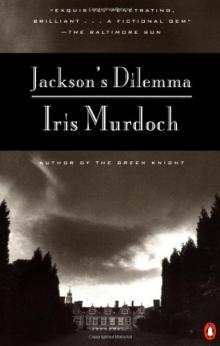 Jackson's Dilemma
Jackson's Dilemma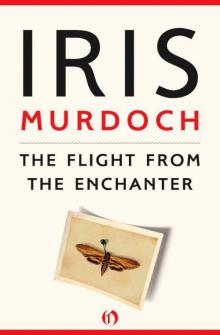 The Flight From the Enchanter
The Flight From the Enchanter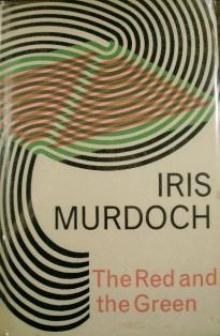 The Red and the Green (Vintage Classics)
The Red and the Green (Vintage Classics)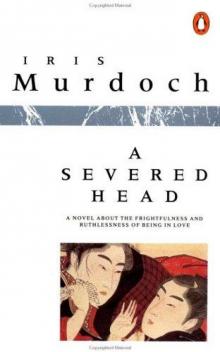 A Severed Head
A Severed Head The Black Prince
The Black Prince The Nice and the Good
The Nice and the Good The Unicorn
The Unicorn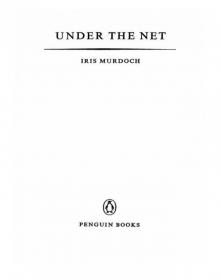 Under the Net
Under the Net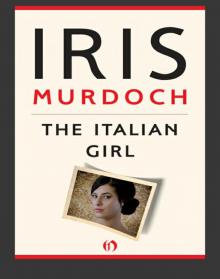 The Italian Girl
The Italian Girl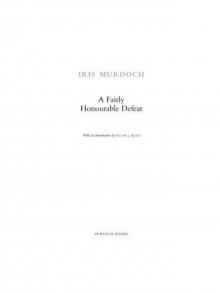 A Fairly Honourable Defeat
A Fairly Honourable Defeat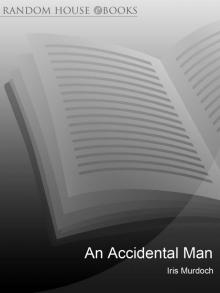 An Accidental Man
An Accidental Man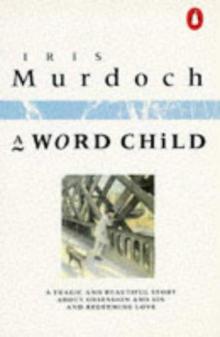 A Word Child
A Word Child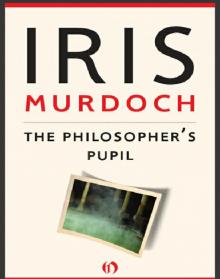 The Philosopher's Pupil
The Philosopher's Pupil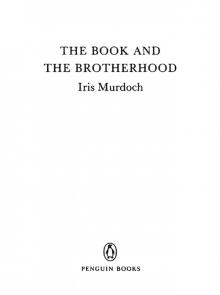 The Book and the Brotherhood
The Book and the Brotherhood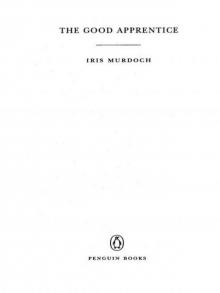 The Good Apprentice
The Good Apprentice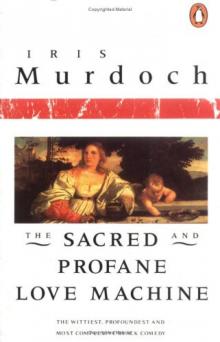 The Sacred and Profane Love Machine
The Sacred and Profane Love Machine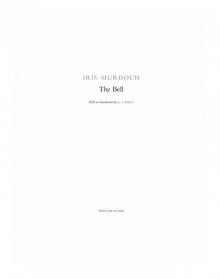 The Bell
The Bell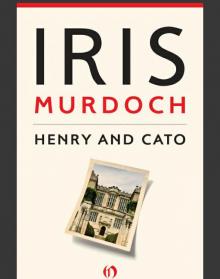 Henry and Cato
Henry and Cato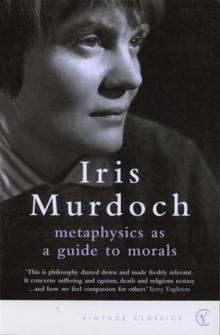 Metaphysics as a Guide to Morals
Metaphysics as a Guide to Morals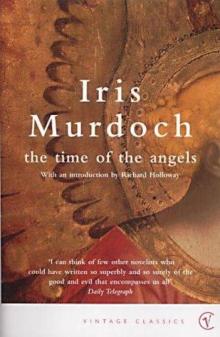 The Time of the Angels
The Time of the Angels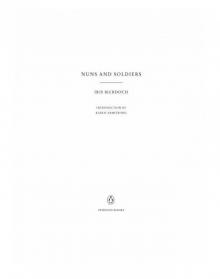 Nuns and Soldiers
Nuns and Soldiers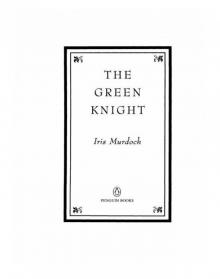 The Green Knight
The Green Knight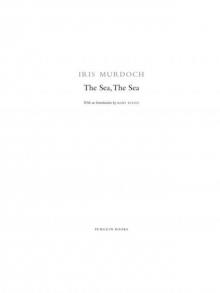 The Sea, the Sea
The Sea, the Sea Sartre: Romantic Rationalist
Sartre: Romantic Rationalist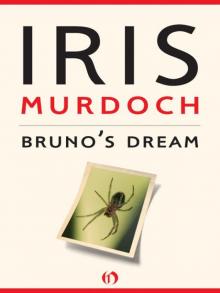 Bruno's Dream
Bruno's Dream An Unofficial rose
An Unofficial rose Sartre
Sartre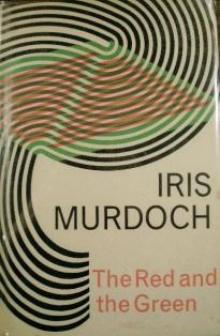 The Red and The Green
The Red and The Green